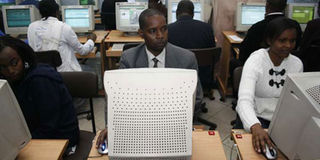Why uptake of Internet remains lowest in Africa

Internet users in a cyber cafe. Improving Information, Communications and Technology infrastructure promotes a country's economic development. FILE PHOTO | NATION MEDIA GROUP
What you need to know:
- Afrinic is the regional Internet registry responsible for issuing unique identifies called Internet Protocol (IP) Addresses to Internet Service Providers (ISPs) and other enterprises across Africa.
- One such study by Deloitte found that when developing countries expand Internet access to the level of developed countries, it would cut extreme poverty by 28 per cent, reduce infant mortality, increase literacy rates, and create millions of jobs.
- The ignorance by the masses has had a profound mark on our society, very few Internet footprints in Africa, and non-depleted IPv4 on the African continent.
In the first week of December, an important meeting, the Africa Network Information Center (Afrinic 23) took place in Pointe Noire, Congo-Brazzaville, to discuss Internet Number resources policies in Africa.
Afrinic is the regional Internet registry responsible for issuing unique identifies called Internet Protocol (IP) Addresses to Internet Service Providers (ISPs) and other enterprises across Africa.
Afrinic has among its members banks, academic institutions, governments, ISPs, and business enterprises.
The ISPs consequently assign the IP blocks to their customers.
IP addresses are the numbers used by computers to communicate with each other on the Internet.
An easier analogy for an IP address is the unique phone numbers we use to communicate with others.
At the Afrinic meeting on Pointe Noire, one thing struck me.
Congo is an oil producing country, but for the whole week, the city was in lockdown.
There was no fuel in petrol stations. Apparently two refineries had closed down for maintenance at the same time.
The impact on the local businesses was obvious.
There was little to no movement of goods and people; hotels and streets were empty.
The economy was at a total standstill. I could see how lack of a commodity can stifle an economy.
Compare that to what happens when a large part of our population has no access to the Internet.
They cannot communicate with the rest of the world, buy and sell goods and services to larger global markets, and get information when they need it.
BENEFITS OF ACCESS IMPROVEMENT
Afrinic is a member-based organisation, with a total of 1291 members.
Of that, South Africa leads the pack with 309 (24 per cent), Nigeria with 148 (11 per cent) and Kenya 84 (7 per cent), with Egypt, Ghana, Tanzania, and Angola coming next.
The other 47 countries take up the remaining 41 per cent.
There is a co-relation between Afrinic membership, Internet penetration, and economic prosperity.
Kenya has done really well compared to other countries, but there is a room for improvement in growing Afrinic membership.
We cannot afford to sit pretty while a country like South Africa has four times more members.
We must consolidate our position as leaders of ICT uptake in Africa.
Why would anybody want to be an Afrinic member?
Membership translates to allocation of Internet number resources (IPs).
Assuming that issued resources translate to more devices connected to the Internet, more Internet-related businesses will be built and therefore we will have more people accessing the virtual domain.
Time and time again, research has shown that internet penetration is tied to economic development.
One such study by Deloitte found that when developing countries expand Internet access to the level of developed countries, it would cut extreme poverty by 28 per cent, reduce infant mortality, increase literacy rates, and create millions of jobs.
Over the years, there have been complaints from end users on allocation of IP addresses by ISPs.
SEEK PROFESSIONAL HELP
You could request a block of IP addresses for use in your business operations but the ISPs would probably give you an allocation that is not enough to run your operations, or they would charge an arm and a leg.
Most organisations remained with a stifled ICT infrastructure.
Some businesses got the hint and became members of Afrinic where they get as much resources as they need, and by only paying a membership fee of as little as $200 per year and a one-off resource allocation fee.
The ignorance by the masses has had a profound mark on our society, very few Internet footprints in Africa, and non-depleted IPv4 on the African continent.
A continent like North America has eclipsed us by usage of these resources a hundred times over.
Afrinic now has more than 50 million IPv4 addresses and virtually unlimited IPv6 addresses for our use.
IPv4, the most used version of IP, has been depleted in all regions of the world apart from Africa.
Although this is a story for another day, I would urge our businesses to apply to get the resources before the west raid our unallocated surplus addresses for legacy deployments.
If you are an organisation with huge public address needs, and your ISP is a roadblock to achieving your ICT strategy, it is highly recommended you get your IP block directly from source by visiting the website afrinic.net.
If you don’t have the time or human resources, you can get an IP strategy consultant to manage your resource allocation and mapping.
Mwendwa Kivuva is a policy fellow based at Strathmore University's Centre for Intellectual Property and IT Law, and a fellow at Kenya ICT Action Network (KICTANet) - [email protected] twitter: @lordmwesh




